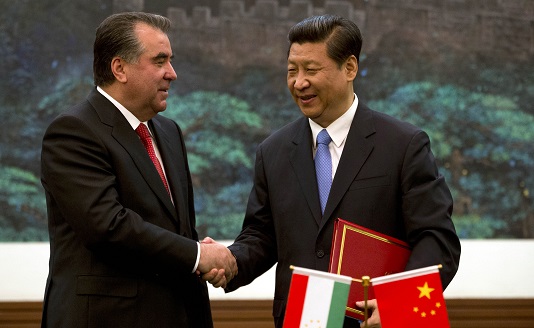The state visit to China of Tajikistan’s President Emomali Rahmon ended with signing the Declaration on establishing strategic partnership between the two countries. President Rahmon especially stressed that “Relations with China are our lasting foreign policy priority.” Before, it had been only Russia that Dushanbe considered its strategic partner.
This Declaration reflects the usual multi-vector approach employed by all Central Asian countries that develop ties with all the states active in the region. At the same time, the Declaration demonstrates that Russia continues to lose its exclusive role in the region. Rahmon’s visit to China and his meetings with the Chinese leaders are taking place as Russia steps up its efforts to restore the post-Soviet space by fostering its connection with Russia. The main instruments for this are the Customs Union and the Eurasian Union. The Kremlin actively urges Tajikistan and other former Soviet Republics to join the Customs and Eurasian Unions.
The Unions received mixed and at times skeptical reaction in Tajikistan, just as in the neighboring Kyrgyzstan and some other states. Moscow is extremely irritated with such response and—while conducting its policy of post-soviet integration—occasionally resorts to putting direct pressure on its partners, which may in turn provoke their discontent. As an illustration, a proposed law would require the citizens of the countries that have not joined the Customs Union to obtain entry visas to Russia. Over a million Tajik citizens come to Russia to work, so the change in visa requirements may deal a serious blow on Tajikistan.
Given the strained relations between Moscow and Dushanbe, the establishment by Tajikistan of a strategic partnership with China can be seen as a signal to Russia indicating that Tajikistan has other partners ready to offer it assistance of all sorts.
Also of note is that the meetings in Beijing saw the signing of economic cooperation agreements which are very important for Tajikistan. The agreements point to China’s even more intensive penetration into the Tajik economy. For instance, the agreement on the development of the Zeravshan joint gold-mining venture was reached (China already holds a 51% stake in the enterprise).Tajik state bank Amonatbank signed a $10-million deal with China Development Bank. The parties also agreed to construct an oil refinery with an annual capacity of 1.2 million ton. The total of eight intergovernmental and interstate agreements that affect the most important spheres of Tajikistan’s economy were signed. In addition, Chinese companies continue to actively participate in the modernization and development of Tajikistan’s infrastructures. Thus, China is pressing in on Russia in Tajikistan.
Besides, unlike toward Russia, Tajikistan has no political grudges against China. The relations between the two countries remain purely economic. However, the Chinese economic expansion makes Tajikistan less politically dependent on Russia, which is evidently perfectly understood in Moscow. In this light, it remains to be seen whether the Declaration on strategic partnership and other cooperation agreements signed in Beijing will make the Kremlin’s policies toward Tajikistan more flexible or on the opposite more stringent.
